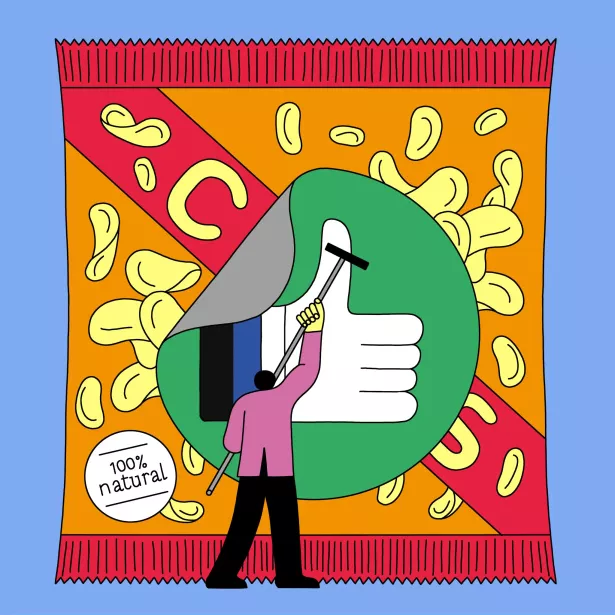In the airport terminal, two different grab-and-go snacks may appeal to travelers rushing to catch their flights: One is a candy bar, wrapped in chocolate and caramel. The other is also a bar wrapped in chocolate and caramel, but it’s “high in protein.”
If that promise of protein has ever influenced your purchase, the “health halo” may have been at work. The term refers to a phenomenon where people may perceive a food product (or drink or supplement) as healthy based on a single claim — even if the snack is not-so-angelic.
“Health halo” borrows from “halo effect,” a cognitive bias where people perceive someone or something in an overall positive way based on a single trait. (A well-used example: assuming a physically attractive person is also kind.)
A single claim (think “low calorie” or “organic”) emblazoned on a package, or a nutritious-sounding ingredient in large font, can do the heavy lifting for a food brand. The claim may be true, but that doesn’t mean the product is healthy: The sugar content of a protein bar, for example, may rival that of a candy bar. Still, the halo has cast a good-for-you glow over the North American protein bar market, which, according to one estimate, could grow to over $11 billion by 2030.
The Food and Drug Administration has some regulations around food labeling. The agency will review an assertion that, say, a bar of dark chocolate could lower blood pressure. But food manufacturers can persuade shoppers with nods and winks.
They’ve been winking for a while, because research suggests it works. For example, one study from 2016 found that people were more likely to think bags of chips were healthier, and buy them, when they were “vitamin-fortified” — even when they were worse dietary decisions.
“If the marketing is well done, it slips below the radar of critical thinking,” said Marion Nestle, an emeritus professor of nutrition and food studies at New York University. “If you’re in a supermarket and it’s got vitamins, it’s no G.M.O., it’s organic, no artificial sweetener, no sugar added — all of those have the same kind of effect: unconscious, subliminal, emotional.”
But some consumers are challenging claims: Last year, three plaintiffs filed a class action complaint against PepsiCo, arguing that it had created a “deceptive health halo” around its Gatorade protein bars, including by marketing the bars as science-backed tools to “help muscles rebuild.” A federal judge ruled in August that the lawsuit against PepsiCo could proceed.
So many decisions around what to eat come down to impulse buys — and those choices are often made in the haze of the health halo.
Dani Blum is a reporter on the Well desk who covers personal health, wellness trends and Ozempic.
Dani Blum is a health reporter for The Times. More about Dani Blum


Spread the word